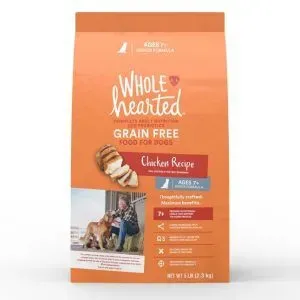Are you searching for a reliable grain-free dry dog food option for your furry friend? WholeHearted Grain Free Dog Food has earned a solid reputation among pet owners, with an average rating of 4 stars across its lineup. This review dives deep into its recipes, ingredients, nutritional profile, and more, helping you decide if it’s the right choice for your dog’s needs. Backed by pet nutrition experts, this analysis ensures you get trustworthy insights.
 WholeHearted Grain Free Senior Chicken Recipe Dry Dog Food
WholeHearted Grain Free Senior Chicken Recipe Dry Dog Food
Pet owners often turn to grain-free formulas like WholeHearted for dogs with sensitivities or those requiring high-protein diets. Available exclusively at Petco, this line includes 17 dry recipes tailored for puppies, adults, seniors, small breeds, large breeds, and specific health needs. Ratings range from 3.5 to 5 stars, showcasing consistent quality. If you’re comparing options, check out taste of the wild dry dog food reviews for similar grain-free alternatives.
Our Verdict on WholeHearted Grain Free
WholeHearted Grain Free Dog Food earns 4 stars overall. It uses named meat meals as primary protein sources, making it above average for dry kibble. The brand’s average protein is 29%, fat at 16%, and carbs around 48% on a dry matter basis—balanced for most active dogs.
Key highlights:
- Strengths: High meat content, probiotics for digestion, chelated minerals for better absorption, and no recall history.
- Considerations: Some recipes include peas and lentils, which boost protein but may concern owners watching legume intake due to ongoing FDA investigations into dilated cardiomyopathy (DCM).
This line suits all life stages, with AAFCO profiles for growth, maintenance, and all stages. Popular picks include Chicken Senior (5 stars), Chicken and Pea Puppy (5 stars), and Salmon and Pea for small breeds (5 stars).
| Recipe Name | Rating | AAFCO Profile |
|---|---|---|
| WholeHearted Chicken Senior | 5 stars | All Life Stages |
| Grain Free Chicken and Pea Puppy | 5 stars | All Life Stages |
| Small Breed Salmon and Pea | 5 stars | Maintenance |
| All Life Stages Salmon and Pea | 5 stars | All Life Stages |
| All Life Stages Chicken and Pea | 4.5 stars | All Life Stages |
| Small Breed Chicken and Pea | 5 stars | Maintenance |
| All Life Stages Beef & Pea | 4.5 stars | All Life Stages |
| All Breed Beef & Pea Puppy | 5 stars | Growth |
| Small Breed Beef and Pea Puppy | 5 stars | All Life Stages |
| Grain Free Lamb and Lentil | 4.5 stars | All Life Stages |
| Large Breed Beef and Pea | 4.5 stars | Maintenance |
| Large Breed Chicken and Pea | 4.5 stars | Maintenance |
Founded by Mike Sagman after a personal loss to poor-quality food, Dog Food Advisor provides impartial reviews verified by nutritionists like Laura Ward (BSc Animal Science) and Karan French.
Detailed Recipe and Label Analysis
We analyzed WholeHearted Grain Free Senior Chicken as a representative recipe. Its guaranteed analysis shows 27% protein, 10% fat (min), with estimated dry matter at 30% protein, 11.1% fat, and 50.9% carbs.
Key ingredients:
- Chicken (first ingredient, quality meat)
- Chicken meal (concentrated protein, 300% more than fresh chicken)
- Peas, pea flour, lentils (fiber-rich carbs, ~25% protein each)
Full list: Chicken, chicken meal, peas, pea flour, lentils, flaxseed, tomato pomace, chicken fat (preserved with mixed tocopherols), natural flavor, and more, including glucosamine, chondroitin, probiotics, and chelated minerals.
Fiber is 5% (dry matter), supporting digestion. Calorie-weighted: 28% protein, 25% fat, 47% carbs.
For puppy or active dogs, consider higher-fat options like Beef & Pea Puppy. Owners report shiny coats and firm stools, per user feedback on sites like Chewy.
If exploring grain-free competitors, see taste of the wild high prairie review for bison-based formulas.
In-Depth Ingredients Breakdown
Chicken provides real meat but loses moisture during processing. Chicken meal boosts protein effectively. Legumes like peas, pea flour, and lentils add fiber and protein but factor into meat content calculations—accounting for ~25% protein from plants.
Flaxseed delivers omega-3s and fiber (19% protein). Tomato pomace offers nutrients but is debated as a filler. Chicken fat supplies essential omega-6s.
Positives:
- Taurine for heart health.
- Chicory root (inulin) as a prebiotic.
- Probiotics (Lactobacillus, Bifidobacterium).
- Chelated minerals for superior absorption.
Concerns: Sodium selenite (less ideal than selenium yeast). No artificial preservatives, aligning with clean-label trends.
This formulation emphasizes joint support (glucosamine, chondroitin, L-carnitine) ideal for seniors.
Nutrient Profile and Suitability
On dry matter: 30% protein (near average), 11% fat (moderate), 51% carbs. Fat-to-protein ratio: 54%. Comparable brands average similar, but meat-forward recipes shine.
Best for:
- Grain-sensitive dogs.
- Seniors (weight management).
- Puppies/small breeds (targeted formulas).
Consult a vet for DCM risks with grain-free diets. Transition gradually over 7-10 days.
Related: taste of the wild wetlands review compares waterfowl proteins.
Recall History
No recalls for WholeHearted Grain Free through November 2025. A strong safety record, per FDA and AVMA data.
Final Thoughts
WholeHearted Grain Free Dog Food delivers value with meat-based proteins, digestive aids, and broad suitability—earning its recommended status. While legumes raise questions, quality ingredients and expert verification make it trustworthy.
For personalized advice, consult your veterinarian. Ready to try? Shop via trusted retailers and monitor your dog’s response.
Explore more: call of the wild dog food reviews, taste of the wild southwest canyon reviews.
References:
- Dog Food Advisor (2024). WholeHearted Grain Free Review.
- AAFCO Nutrient Profiles.
- FDA Pet Food Recall Database.
